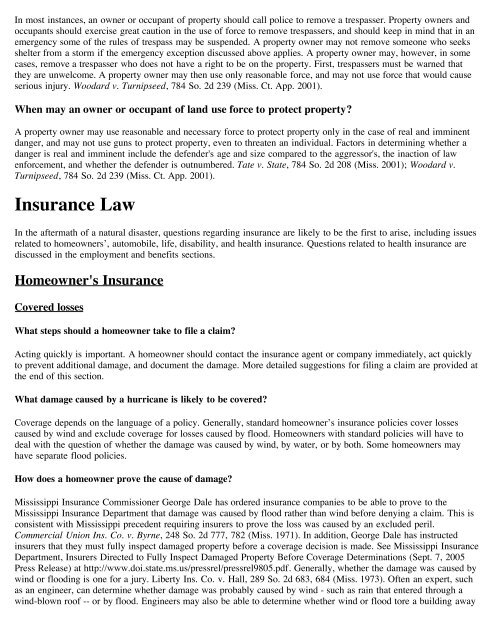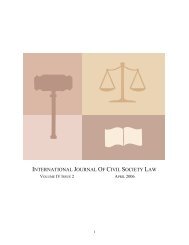Hurricane Katrina: Legal Issues - Columbus School of Law
Hurricane Katrina: Legal Issues - Columbus School of Law
Hurricane Katrina: Legal Issues - Columbus School of Law
Create successful ePaper yourself
Turn your PDF publications into a flip-book with our unique Google optimized e-Paper software.
In most instances, an owner or occupant <strong>of</strong> property should call police to remove a trespasser. Property owners and<br />
occupants should exercise great caution in the use <strong>of</strong> force to remove trespassers, and should keep in mind that in an<br />
emergency some <strong>of</strong> the rules <strong>of</strong> trespass may be suspended. A property owner may not remove someone who seeks<br />
shelter from a storm if the emergency exception discussed above applies. A property owner may, however, in some<br />
cases, remove a trespasser who does not have a right to be on the property. First, trespassers must be warned that<br />
they are unwelcome. A property owner may then use only reasonable force, and may not use force that would cause<br />
serious injury. Woodard v. Turnipseed, 784 So. 2d 239 (Miss. Ct. App. 2001).<br />
When may an owner or occupant <strong>of</strong> land use force to protect property?<br />
A property owner may use reasonable and necessary force to protect property only in the case <strong>of</strong> real and imminent<br />
danger, and may not use guns to protect property, even to threaten an individual. Factors in determining whether a<br />
danger is real and imminent include the defender's age and size compared to the aggressor's, the inaction <strong>of</strong> law<br />
enforcement, and whether the defender is outnumbered. Tate v. State, 784 So. 2d 208 (Miss. 2001); Woodard v.<br />
Turnipseed, 784 So. 2d 239 (Miss. Ct. App. 2001).<br />
Insurance <strong>Law</strong><br />
In the aftermath <strong>of</strong> a natural disaster, questions regarding insurance are likely to be the first to arise, including issues<br />
related to homeowners’, automobile, life, disability, and health insurance. Questions related to health insurance are<br />
discussed in the employment and benefits sections.<br />
Homeowner's Insurance<br />
Covered losses<br />
What steps should a homeowner take to file a claim?<br />
Acting quickly is important. A homeowner should contact the insurance agent or company immediately, act quickly<br />
to prevent additional damage, and document the damage. More detailed suggestions for filing a claim are provided at<br />
the end <strong>of</strong> this section.<br />
What damage caused by a hurricane is likely to be covered?<br />
Coverage depends on the language <strong>of</strong> a policy. Generally, standard homeowner’s insurance policies cover losses<br />
caused by wind and exclude coverage for losses caused by flood. Homeowners with standard policies will have to<br />
deal with the question <strong>of</strong> whether the damage was caused by wind, by water, or by both. Some homeowners may<br />
have separate flood policies.<br />
How does a homeowner prove the cause <strong>of</strong> damage?<br />
Mississippi Insurance Commissioner George Dale has ordered insurance companies to be able to prove to the<br />
Mississippi Insurance Department that damage was caused by flood rather than wind before denying a claim. This is<br />
consistent with Mississippi precedent requiring insurers to prove the loss was caused by an excluded peril.<br />
Commercial Union Ins. Co. v. Byrne, 248 So. 2d 777, 782 (Miss. 1971). In addition, George Dale has instructed<br />
insurers that they must fully inspect damaged property before a coverage decision is made. See Mississippi Insurance<br />
Department, Insurers Directed to Fully Inspect Damaged Property Before Coverage Determinations (Sept. 7, 2005<br />
Press Release) at http://www.doi.state.ms.us/pressrel/pressrel9805.pdf. Generally, whether the damage was caused by<br />
wind or flooding is one for a jury. Liberty Ins. Co. v. Hall, 289 So. 2d 683, 684 (Miss. 1973). Often an expert, such<br />
as an engineer, can determine whether damage was probably caused by wind - such as rain that entered through a<br />
wind-blown ro<strong>of</strong> -- or by flood. Engineers may also be able to determine whether wind or flood tore a building away

















